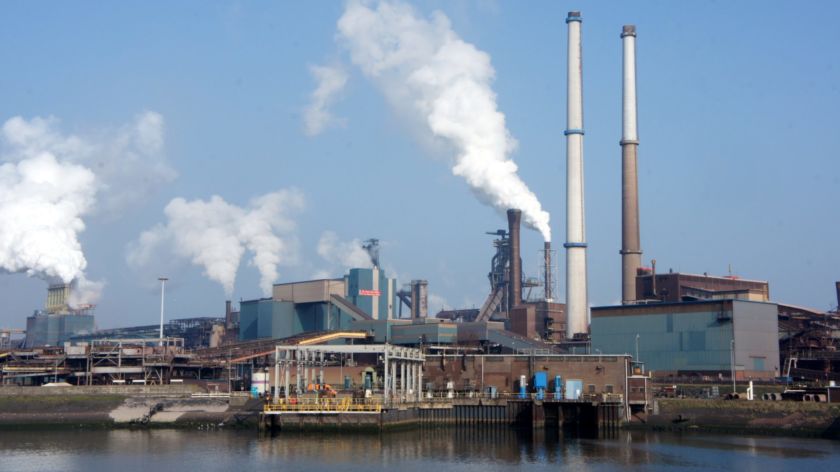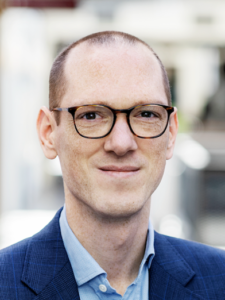-
 Tata Steel in IJmuiden. Photo: Wikimedia Commons
Tata Steel in IJmuiden. Photo: Wikimedia Commons
Around 30.000 people will be attending the climate summit COP26 in Glasgow this- and next week. Among those attending are lobbyists, action groups, students, and scientists. Sustainability researcher Vincent de Gooyert from Nijmegen will be one of them.
Why are you going to Glasgow?
‘Besides the negotiations there are all sorts of so-called side events. Those can be compared to a scientific conference where experts from all over the world can meet up. Except in this case there will be not just scientists present, but also people from different organisations such as NGOs (Non-governmental organisations like Greenpeace, ed.). I’m not entirely sure how that is going to work. This will be my first time attending a climate summit.’
What will you specifically be doing?
‘I hope to exchange ideas with other experts on the same subjects. On Monday, I will be holding a presentation on a major European science project that I’m involved in, called C4U. For this project we’re investigating the possibilities for carbon capture in the steel industry, or CCS. This involves storing the CO2 that’s released in the production of steel in the ground.’
Wouldn’t it be better to produce steel using renewable energy, rather than storing CO2? That would fix the root of the problem.
‘Of course it would be preferable if eventually these kinds of factories ended up using green hydrogen, i.e. hydrogen that’s produced using renewable electricity. But in that case the energy needs of a single steel mill would require more than double the number of wind turbines currently in the North Sea. It is going to take years before something like that can be realised. Until then we will need an alternative to reduce concentrations of CO2, and CCS can help with this. It’s a technology that is available in the short term, and also necessary. According to reports by climate panel IPCC, if you want to limit global warming to 1.5 degrees, you’re almost always going to need CCS.’
What exactly are you researching for this project?
‘I am mainly focused on the societal aspects of CCS. Just because something is technologically possible does not guarantee that it will be applied. I am working to map out which social factors are crucial in this regard, and what kinds of objections local residents and other involved parties bring to the table.’
What could those objections be?
‘Some people fear that CCS would allow companies to continue as they have done in the past. After all, for them the CO2 issue would become less urgent. There is also the risk that CCS subsidies would come at the cost of long-term sustainability investments, such as wind energy. That is why the Netherlands has a cap on the amount of subsidies that can go to CCS initiatives.
Not only that, these technologies have all kinds of social consequences; something sustainable can have a negative impact on society. The closing of the Dutch State Mines in the seventies caused a societal landslide in Limburg because of the massive loss of jobs. The same thing could happen in steel mills that run on green hydrogen. These would preferably be built as close as possible to places where renewable energy is produced, such as hydroelectric power plants or wind farms at sea. Because of this, companies like Tata Steel could disappear from Ijmuiden, heavily impacting the local labour market. That is not the case when it comes to CCS. In order to make sustainability decisions that are just and have enough support from the community, it is important to account for these kinds of consequences.’
Do you think it’s even possible to limit global warming at this point?
‘That question is on my mind every day. It could honestly go both ways. On the one hand there are major forces content to maintain the status quo. A lot of things are very difficult to change, simply because they’ve ‘always been this way.’ This is true for agricultural- and industrial policy, as well as eating habits and holiday behaviour. On the other hand, we have managed to solve environmental problems before, such as acid rain or the hole in the ozone layer. That means we can do it this time as well.’
‘We have managed to solve environmental problems before’
‘Most of all, I’m hoping for a positive non-linear effect. That means that greening will happen faster and faster. There are already signs of this: producing renewable energy using solar panels is already much cheaper than what was predicted ten years ago. This is because the experience that companies have gained has led to much more efficiency. Something like that can also happen with electric cars, for instance. And just look at how quickly the norms surrounding vegetarian food are shifting.’
What is a climate summit?
The United Nations has hosted an annual climate summit since 1995, also known as the Conference of the Parties (COP). During these summits, world leaders, scientists and other experts on climate change come together to think about how to deal with climate change. Participants also look at the effects of earlier regulations. Based on those effects they release advisory reports with suggested improvements. The 26th edition, COP26, will be held in Glasgow this year, from October 31th through November 12th.




